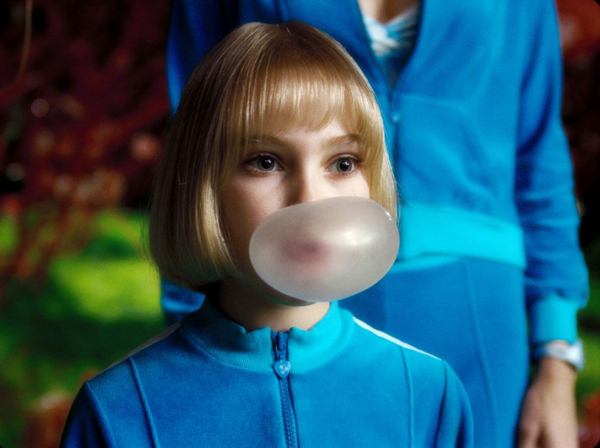Movie review by Greg Carlson
According to popular lore, author Roald Dahl didn’t care much for Mel Stuart’s 1971 film version of his most famous story, so one begins to wonder what he might make of director Tim Burton’s spin on “Charlie and the Chocolate Factory” had he lived to see it. A solid cult has developed around Gene Wilder’s eccentric portrayal of confectioner extraordinaire Willy Wonka, but if any current performer can rival Wilder’s blend of self-involved whimsy and bleak disdain for spoiled children, it is Johnny Depp, who clearly takes great pleasure in stretching almost all of his screen characterizations to their outer limits. As Wonka, Depp is a wonder to behold, turning “Charlie” into one of this disappointing summer’s few must-see movies.
In its original literary incarnation as well as its status as a perennial television and home video staple for several generations, the basic story is so well known it needs little recounting: decent, thoughtful, but near-destitute Charlie Bucket joins four other children for a tour of Wonka’s factory upon finding a golden ticket tucked in a chocolate bar. Charlie exhibits none of the character flaws (gluttony, ambition, greed, and petulance) embodied by his colorful companions, who are taken out Agatha Christie-style for their sins. Burton’s update, penned by his “Big Fish” collaborator John August, adds a new backstory involving Wonka’s strict dentist father.
Burton has always been in his element when depicting large-scale set pieces of exhilarating caliber, and “Charlie” provides the perfect opportunity for the filmmaker to outdo himself. Along with production designer Alex McDowell, Burton envisions a spectacular series of environments, which should satiate even the most demanding audience members. From the chocolate waterfall to the nut-sorting chamber populated by trained squirrels, the movie’s rainbow-hued imagery is quirky, intelligently assembled, and unique enough to stand apart from the earlier rendering. The same can be said for the Oompa-Loompas, all played by Deep Roy.
Roy’s various Oompa-Loompa guises offer a delightful complement to the action, and one marvels at the sheer amount of time and work the actor must have spent in the rehearsing and photographing of the amusing dance sequences. The new “Charlie” ditches the tunes from the original film in favor of Danny Elfman compositions using Dahl’s rhymes as lyrics, and each of the numbers incorporates a different pop music genre to make its point. Purists might blanch at Burton’s willingness to contemporize elements of the story (for example, Mike Teavee, not merely content to watch the boob tube, is a video game maniac obsessed with a first-person shooter). For the most part, however, the updates do not get in the way of the central story, and the new film displays an almost surprising amount of emotion when it counts.
Burton appears to be having a great deal of fun, and his enthusiasm is often transferred to the audience. Adults will enjoy the series of allusions to Kubrick, Hitchcock, Busby Berkeley, and other great filmmakers. The exterior of Wonka’s factory resembles something out of Lang’s “Metropolis,” and the Bucket dwelling, with its severe angles and gravity-defying construction, seems like it was plucked from “The Cabinet of Dr. Caligari.” The cast, which includes Freddie Highmore, David Kelly, Helena Bonham Carter, Noah Taylor, and Christopher Lee, is expertly assembled, and even bit players with few or no lines have memorable faces. Burton and Depp will continue their successful collaboration with “Corpse Bride” this September. Given their strong track record together, fans will no doubt crave even more in the future.
